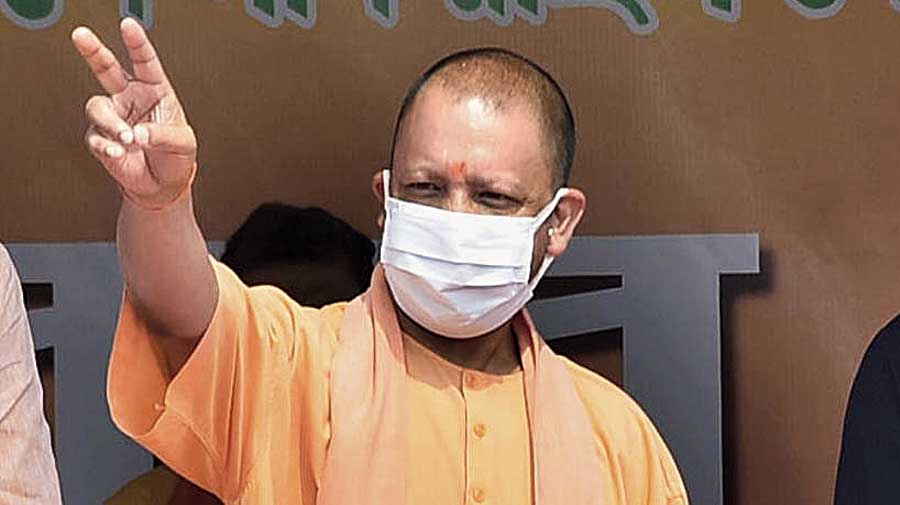Divisive tactics
Sir — The poll bugle for the Uttar Pradesh assembly elections has officially been blown. Unsurprisingly, the incumbent chief minister, Yogi Adityanath, the most strident face of Hindutva in the country, has intensified his attack on the largest minority community to polarize the electorate along communal lines. His latest remark, that under the earlier dispensation “people who say ‘abba jaan’ used to digest the rations” — abba jaan is commonly the way fathers are addressed by the Muslim community — has to be seen as a part of his and the Bharatiya Janata Party’s strategy for the upcoming elections.
In a country where sedition charges are levied on the flimsiest of reasons, it would be a mockery of the rule of law if a chief minister is allowed to go scot free after making such a statement. His remark causes hurt and incites hatred against members of the Muslim community, which is a criminal offence under the Indian Penal Code. It is evident that given Adityanath’s poor track record in governance, he is not confident about contesting the election on bread and butter issues. Instead, he has taken recourse to communalism and hatred. This is dangerous. The courts should take suo motu cognizance of the matter and order the filing of a first information report to bring the errant chief minister to justice.
S.K. Choudhury,
Bangalore
Slippery customer
Sir — When the Pegasus scandal was first exposed, I remember a TV debate in which an Opposition leader had said that if this matter is taken to court, it will go into cold storage because the government will refuse to disclose any information, citing the security of the country. This fear was realized in the Supreme Court when the Centre refused to file a fresh affidavit admitting or denying snooping on citizens (“Deadline for govt on Pegasus”, Sept 14).
The government’s reluctance makes the matter more suspicious. The Supreme Court bench led by the Chief Justice of India has asked a simple question: whether the government had used Pegasus to snoop on citizens? Had the government been innocent of the charges, it could have simply denied them. Can it then be assumed that the Israeli spy software had indeed been used to invade the privacy of Indian citizens? The top court’s interim order is still awaited. In the meantime, the government should have a very good reason as to why it infringed on the privacy of citizens.
Jang Bahadur Singh,
Jamshedpur
Sir — The Centre is testing the patience of the Supreme Court in the Pegasus issue by deliberately avoiding a very basic question about whether Pegasus has been used to spy on judges, journalists, politicians and activists. The court was right to admonish the solicitor-general, Tushar Mehta, for beating around the bush by repeating that the Centre could not speak about the issue as it concerned ‘national security’. The need of the hour is to conduct a court-monitored probe into the matter. The interim order of the apex court in this regard is eagerly awaited.
Arun Gupta,
Calcutta
Sir — The Centre must explain exactly how revealing whether it used Pegasus to spy on those who did not see eye to eye with the government is a matter of ‘national security’. The bogey of ‘national security’ has become too hackneyed for even the most die-hard admirer of the current dispensation to believe. By now, everyone knows that the government is crying wolf. The Supreme Court was absolutely right in rubbishing the claims of the solicitor-general and telling him off for beating around the bush instead of answering the court’s questions.
One hopes that the Supreme Court will set up an independent probe into the matter — given the climate in the country, no State agency can be trusted any longer — which will be monitored by the court itself. Moreover, steps must be taken to ensure that while the fracas continues over whether or not people have been spied upon, more people are not being subjected to the same snooping. The sanctity of the democracy is at stake here.
P. Gundu Rao,
Ghaziabad, Uttar Pradesh
Sir — The apex court has regained some of its lost trust with its recent statements. This is encouraging as an upright judiciary is the last hope of saving the Indian democracy.
Jayanta Biswas,
Calcutta
Sunken ship
Sir — Camels were once a prized possession for breeders in Rajasthan. But that ended with the passage of the Rajasthan Camel (Prohibition of Slaughter and Regulation of Temporary Migration or Export) Act, 2015. As with most legislations formulated without any idea of the pastoral ecosystem, this law has ensured a precipitous dip in camel breeding and, in turn, its population. Reports suggest that the number of camels in the state has gone from 3.25 lakh in 2012 to 1.5 lakh in 2019. If Satyajit Ray had filmed Sonar Kella now, Feluda would never have reached Ramdevra on time.
Amit Chakraborty,
Calcutta











